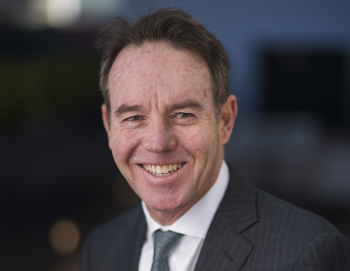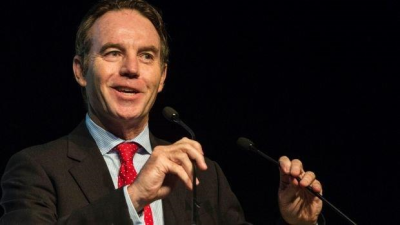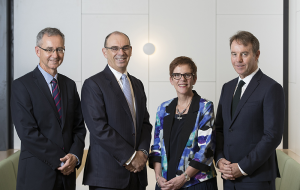A conversation with outgoing APRA Member Geoff Summerhayes

Geoff Summerhayes’ five-year term as APRA Member ends this December. Geoff’s responsibilities have included the oversight of the general insurance, life insurance and private health insurance sectors. He has also focused on raising industry’s preparedness to address emerging risks including climate and cyber risk.
Prior to taking up his role at APRA, Geoff was CEO of Suncorp Life from 2008-2015. Before that, Geoff spent more than 20 years gaining property and financial services experience at Lend Lease, MLC and NAB.
What did you set out to achieve when you started at APRA five years ago?
When I was first approached in 2015 about the role as an APRA Member, I dismissed it as I didn’t see myself as a regulator. But after a few meetings with Wayne [Byres], I thought: this is a unique opportunity to give back and make a difference.
Being appointed for a five-year term makes you very focused, and I wanted to initially make a difference to how APRA ran as an organisation, as opposed to how APRA created policy or supervised entities. My expertise and experience had been in running businesses, and I enjoyed working out how to get the best out of organisations. Having spent most of my career as an APRA-regulated executive, I had a sense of APRA’s dynamic.
Regulation hadn’t been something I’d aspired to, so one of my pieces of research before I started was to read Ben Bernanke’s 2015 book, ‘The Courage to Act’. Bernanke was in charge of the US Federal Reserve during the GFC. As the title promises, ‘The Courage to Act’ really epitomised what Bernanke did during that period. He made some bold calls and I think that emboldened me to do the same. So I arrived at APRA with the view of wanting to influence change.
Where did you see room for improvement at APRA?
When I joined, APRA was approaching its 20th anniversary, and we’d been very successful as an organisation. But I felt that what had made APRA successful in its first 20 years wouldn’t be the same attributes that would make it successful in its next 20 years.
The biggest risk to any successful organisation is complacency. When I joined APRA in 2016, I could see that the winds of change were gathering velocity, although they hadn’t fully blown through, and we needed to be better prepared for them. The issues coming our way included the need for greater transparency and increased accountability, and the shifts in community expectations on regulated entities.
I would say that my colleagues, Wayne [Byres] and Helen [Rowell], both knew that we need to make changes. But I had the benefit of coming in fresh and being able to perform the role of being “The Disturbance Factor.” I think I played a useful role in creating awareness of the need for change.
You were recently described in the Australian Financial Review as “the driving force behind APRA’s push for climate risk standards.” Had you always planned to focus on climate risk, or did your interest evolve along the way?
My initial observation was that APRA, appropriately so, was very focused on so-called ‘core prudential risks’. These are important risks – capital, solvency, liquidity, credit risk, insurance risk, investment risk, and they’re part of APRA’s DNA. However, like many other organisations, we needed to develop our thinking about a large and growing basket of what I called ‘emerging, emerged and accelerating risks,’ such as social licence, culture, regulatory change risk, customer, cyber, climate, governance. But I didn’t purposely start with a particular focus on climate-related risks.

Then, in early 2017, I gave a speech about climate change financial risk in the context of these emerging, emerged and accelerating risks. I thought it was a good speech, but I was in no way prepared for the reaction that flowed from it. It generated a huge response, mainly positive, but there was some comment in the media that regulators should “stick to their knitting” [capital, solvency, liquidity]. That was good impetus for me to actually go harder, because it’s very much a financial risk with real prudential implications.
The speech was a turning-point moment, and from that time on, I improved my knowledge, created engagement and understanding in APRA and across the CFR [Council of Financial Regulator] agencies, got involved in a number of international regulatory forums, and made several other speeches on climate-related risks. I think we’ve made a huge impact on the Australian regulatory landscape, and done a lot internationally. There’s been a paradigm shift in awareness, and increasingly, action, in the last four years.
In February this year, you said that APRA had prudential concerns about the state of the private health insurance industry and described the situation as ‘serious but stable’. Since then, COVID-19 has created additional challenges for private health insurers. What’s your parting message to the industry?
What I said in my private health insurance speech at the start of the year still stands. That is, policyholders should have confidence in taking out health insurance but there are some real challenges in the health and insurance sector: we have an ageing population, we have a demand for high quality care and we have a system that’s seeing twin challenges.
The first challenge is that costs are going up faster than the price people are prepared to pay. The second is that young people are dropping out of the system, saying they’ll take out health insurance when they need it, which is a structural flaw. These challenges need a whole of system review but that will take time, and as a community we are dealing with another health crisis at the moment.
So our message to health insurers has been that while these issues are being worked through, insurers need to improve their resilience, understand their own situation, and they need to have a plan B. Every APRA-regulated entity should be thinking of recovery and resolution planning.
You’ve made numerous reforms to the insurance industry during your time at APRA. What do you see as the main challenge now facing the general insurance industry?
The main challenge is the implications of COVID, many of which are permanent in my view. With the structural changes that are occurring, we’re seeing a decade of change in a couple of years. This has business model implications for how entities think about their commercial viability into the future.
The community’s risk appetite has changed. I don’t think you can have societal change like we’re having right now, and then only offer the same products, services and customer solutions that that were being offered in 2019. People are interacting in a different way now. What are the business opportunities that can flow from that? How do you insure and package them? As a regulator we tend to focus on risk, but there’s as much opportunity here as there is risk. The challenge for businesses and regulators is to adapt.
What do you think are the some of the risks on the horizon that will pose the greatest challenges to APRA and its regulated entities?
APRA regulated firms have done remarkably well during COVID. Other sectors of the economy have been laid bare, whereas financial services in the main hasn’t missed a beat. That’s a reflection, in part, on prudential regulation and supervision.
But COVID has driven two megatrends: rapid expansion of digitisation of the economy, and the importance of customer connection. I think the key insight to have come out of COVID is that businesses that are digitally enabled and customer connected have done better, regardless of industry. Those businesses have been able to pivot their business models, distribution channels, products and services, and they’ve done it quickly so they can remain viable, and in some cases, they’ve really thrived.
Those megatrends will be key drivers of how APRA-regulated entities will evolve over time, and I think APRA will need to pay close attention to that.
When you look back over your five years at APRA, what are you most proud of? Do you have any regrets?
I definitely don’t have any regrets. What I’m most proud of is that APRA is a very different organisation to what it was in 2015. We’ve dramatically improved our strategic planning process. We have a very clear strategy, we're better governed, we've improved accountability of the organisation, and we’ve lifted the talent in the organisation, which has led us to be more inclusive and diverse than we were five years ago. I also believe that climate change is the challenge of our time, and I’m proud of the bold leadership role that APRA has played.
So that makes it a very good time for me to go, because APRA is well set up for the future. I have absolute confidence in my colleagues, and I feel very comfortable passing the baton.

What will you miss about working at APRA?
When you operate in a commercial firm, that becomes your ecosystem, and you view other firms through the lens of a competitor. And while you often have theories about how other businesses operate, it’s sketchy and full of bias.
What’s unique and hugely privileged about APRA’s position in the financial services industry is that you see the whole system – not just domestically, but globally – and you have a sense of relativity and of others’ strengths and weaknesses. And you can use that insight to influence for the better. I’ll miss that whole-of-system perspective.
What’s next for you?
I’m looking forward to a break and time on our family farm. But I want to continue to make a difference. I see this time as a transition from being a full-time executive to having a portfolio of roles. I’d like to continue my leadership role on climate, and in time, I’d like to build a diverse and interesting portfolio of non-executive positions to make a contribution at a board level.
I’d also like to support others in a mentoring and advisory capacity. I think the act of giving is very rewarding. The person who gives the gift always – well, mostly – gets more satisfaction than the person receiving it.
What advice would you give someone starting their career in financial services?
There’s a lot in the name ‘financial services.’ Many people think of financial services as a service to them, like a ticket to somewhere. But if you approach the industry with the notion that it’s a service to others, then it will be incredibly rewarding to you.
When I finished university – much to my parents’ horror – I started running nightclubs. I actually learned some really valuable lessons there, and it’s still how I think as a leader. If you’re running a team, or running an organisation, you’re actually creating a set of experiences for your employees and your customers. If you create positive experiences that people enjoy, they’ll stay. They’ll keep buying from you. They’ll keep partnering with you and they’ll keep coming back. So be conscious that working in financial services isn’t a service to you, it’s a service to others.
The Australian Prudential Regulation Authority (APRA) is the prudential regulator of the financial services industry. It oversees banks, mutuals, general insurance and reinsurance companies, life insurance, private health insurers, friendly societies, and most members of the superannuation industry. APRA currently supervises institutions holding around $9.8 trillion in assets for Australian depositors, policyholders and superannuation fund members.